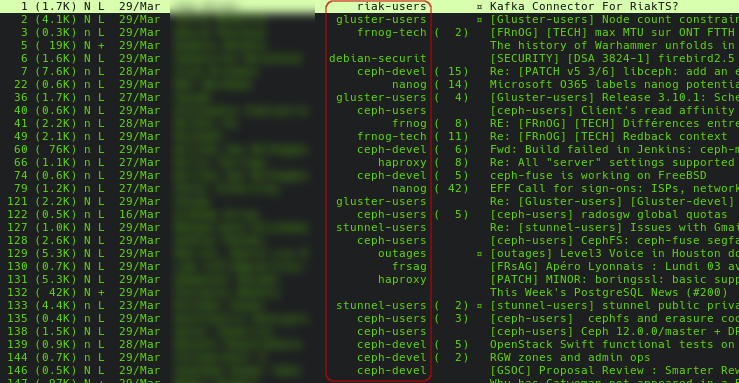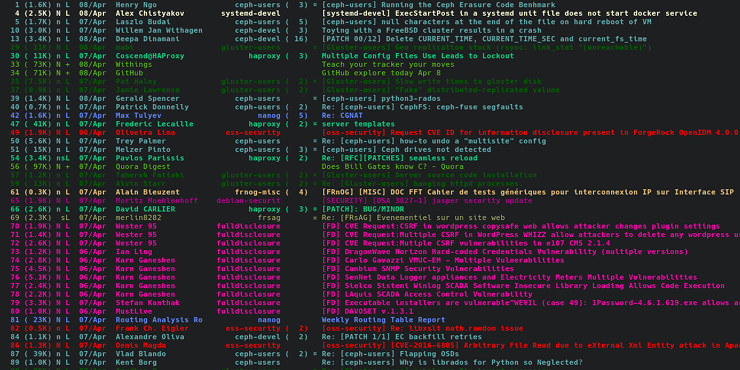For a long time Gmail filters were keeping my inbox clean by automatically archiving all emails incoming from mailing lists. Even if it looks efficient, there's actually a big issue. Do you seriously take time to read all these unread archived emails?
If you already missed an important vulnerability report or answered to a two-year old unanswered question on a mailing list, take a seat.
Back in the days when I started to use Mutt, I also started to auto-archive mailing lists for two reasons:
- Some mailing lists keeps the original subject which provides no way to easily read the name in the index view of Mutt
- And I lost the color of my Gmail labels
Few weeks ago I started looking for a way to remove this auto-archive and still keep a readable inbox.
The first thing was to always have the mailing list name on the index view.
I discovered %L while reading some Mutt documentation. Used in
$index_format, %L will print the list-name if an address defined in
subscribe if found in the To or CC headers.
So, basically I listed all mailing lists to which I am subscribed like this in
my .muttrc:
subscribe ceph-users@lists.ceph.com ceph-users@ceph.com ceph-devel@vger.kernel.org
subscribe haproxy@formilux.org
subscribe riak-users@lists.basho.com
subscribe systemd-devel@lists.freedesktop.org
# And so on…
The downside of this feature is that it will print the maildir folder if no subscribed address is found:
%L
If an address in the To or CC header field matches an address defined by the users ``subscribe'' command, this displays "To <list-name>", otherwise the same as %F.
It's important to say here that I recently replaced Mutt with NeoMutt, a quite active fork which includes a lot of patches like the sidebar and notmuch support.
So… Let's do some hacking.
After few hours in some C files, I proposed a change to NeoMutt: add support of
%K. %K is basically like %L
but it will remain empty if no subscribed address is found and it can be used
with a condition (%?x?&?).
With this change we can have an $index_format of the following form:
set index_format = "%4C (%4c) %Z %?GI?%GI& ? %[%d/%b] %-20.19F %?K?%15.14K& ? %?M?(%3M)& ? %?X?¤& ? %s %> %?g?%g?"
Which will create a dedicated column for the list name like in the following image:

In the previous example %?K?%15.14K& ? instructs Mutt to:
%?K?%15.14K: print the first 14 characters of%Kin a field limited to 15 characters if%Kis not empty& ?: print 15 whitespaces otherwise
Now that I have a textual equivalent to Gmail labels, there is one thing left: colors.
Let's do some really nasty things with color index and patterns:
color index color73 default "~C haproxy@formilux.org"
This line will use color73 as foreground color for all emails sent to the HAProxy mailing list.
We can even have a bold color for new emails from this mailing list:
color index brightcolor73 default "~N ~C haproxy@formilux.org"
Here is an excerpt of my subscriptions configuration file for Mutt:
subscribe ceph-users@lists.ceph.com ceph-users@ceph.com ceph-devel@vger.kernel.org
color index color73 default "~C ceph-users@lists.ceph.com | ~C ceph-users@ceph.com | ~C ceph-devel@vger.kernel.org"
color index brightcolor73 default "~N (~C ceph-users@lists.ceph.com | ~C ceph-users@ceph.com | ~C ceph-devel@vger.kernel.org)"
subscribe haproxy@formilux.org
color index color42 default "~C haproxy@formilux.org"
color index brightcolor42 default "~N ~C haproxy@formilux.org"
subscribe riak-users@lists.basho.com
color index color30 default "~C riak-users@lists.basho.com"
color index brightcolor30 default "~N ~C riak-users@lists.basho.com"
subscribe frnog@frnog.org frnog-.*@frnog.org
color index color3 default "~C frnog@frnog.org | ~C frnog-.*@frnog.org"
color index brightcolor3 default "~N (~C frnog@frnog.org | ~C frnog-.*@frnog.org)"
subscribe frsag@frsag.org
color index color10 default "~C frsag@frsag.org"
color index brightcolor10 default "~N ~C frsag@frsag.org"
Yes, I'm using a dedicated color for each mailing list. The complete file gives me the following colored inbox:

Note: the support of %K should land in the next release of NeoMutt. If you
want it now you should patch your installation using
this patch.
For more information:
$index_formatin Mutt's documentation$index_formatin NeoMutt's documentation- Mailing Lists in Mutt's documentation
- Patterns in Mutt's documentation
Enjoy!